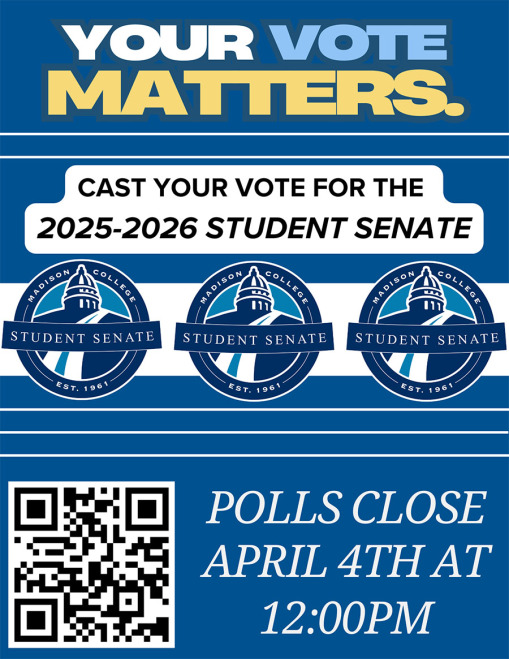History was made by Madison College in the fall of 2023 when a bill was introduced by the Student Senate making a case for the formation of a new Senate position: the Inclusion and Belonging Coordinator.
According to Senate Bill #002, “Madison College’s student population includes 35% of learners identifying as Black, Indigenous, Latine, Asian American Pacific Islander (AAPI), international, and other cultures, creating a truly diverse global community” and that “it is crucial to create an inclusive environment that supports and accommodates all students… to ensure equity, inclusivity and a sense of belonging on campus.”
In January, T. Clearwater took on the role of Inclusion and Belonging Coordinator in addition to their Student Senator role. Despite being halfway through the school year and not knowing if the role will be permanent, Student Senate advisor Sean Green said that they needed to do “what was best for the students.”
“You have to admire a person who takes on a position like that,” Green said, describing taking on this newly created position. “There’s so much that’s being immediately ask of you.”
This position has three primary responsibilities: Student Outreach and Engagement, Communications and Collaboration and Campus Climate and Intergroup Relations. The person in this role will act as a liaison between the Student Senate and the Diversity and Community Relations Council. They will also collaborate with the Vice President of Public Relations and Team Development and work “with the Vice President of Legislative Affairs to maintain a library archive of Student Senate Resolutions that recognize identity-based groups on campus, including inclusive cultural practices, disabilities rights, and LGBTQ+ students on campus,” reads the bill that created the role.
“My whole job is basically being like ‘yeah… your view is valid, and your view is valid’ and taking the time to validate a lot of people’s lived experiences,” said Clearwater.
When running for Student Senate, Clearwater’s platform was to represent “racial diversity and 2SLGBTQ+ diversity.” Clearwater is bi-racial with both a white and Native American background and is a two-spirit individual who is Indigiqueer.
Clearwater wants to facilitate meaningful dialogues between staff and students about the past and current events “so that peoples’ identities (aren’t) being washed-out of their experiences in schools.” For example, Thanksgiving is thought of as being a family holiday. “Maybe it is about family, but whose?” said Clearwater. “Constantly bringing this to the table. Whose perspective are we talking about?”
Clearwater knows first-hand how important it is for peoples’ perspectives to be considered while in school. In the early 2000s they “had to deal with being the Indian in the school play of Thanksgiving.” Because the event was an “authentic re-creation,” it meant “in this play my classmates had to murder me,” said Clearwater.
“I will use the word ‘empathy,’” says Green, “It’s trying to see things through a different and empathetic eye.” He follows a philosophy his dad taught him and intends to make the student senate “better than (he) found it.”
This year’s Senate is more “racially and ethnically balanced,” Clearwater said. Senators who now share space with those who have different perspectives are now experiencing how it feels to be the only one speaking from a particular viewpoint. “It’s just not about a power dynamic issue… it’s just (about) other people having a seat at the table,” Clearwater said.
Students and faculty can come to Clearwater, and they can help navigate complex perspective issues by suggesting resources, asking questions, listening, hugging and being a source of emotional support.
One of the ways Clearwater helps people identify perspectives is by using words which are not “aggressive” such as referring to the ways people are different as their “demographics.”
A project that’s in progress is starting to use the term “gender expansive” to describe those who don’t come under the category of cis-gender.
“One of the things that ‘gender expansive’ allows for is evolution,” Clearwater said. “People have evolving identities, expanding identities that have the potential to change over time.”
Additional tasks of the Inclusion and Belonging Coordinator include providing weekly updates on campus climate efforts and attending all required committee and council meetings regularly as a member of the Senate.
“Struggling with identity can happen at any point in your life,” Clearwater says. Both Green and Clearwater stress the importance of making this position institutionalized so it will last through the next three years and beyond and help future generations of students stay open to perspectives outside of their own.

























